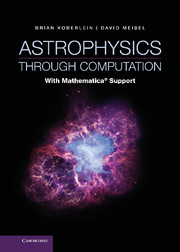4 - Extreme classical stars
Published online by Cambridge University Press: 05 June 2014
Summary
In Chapters 2 and 3 we looked at atmospheres and interiors of main sequence stars. For such stars we may assume both local thermodynamic equilibrium and the physics of an ideal gas. In this chapter we move beyond these simple assumptions. We begin by looking at atmospheric models in which local thermodynamic equilibrium is not valid, such as the case of expanding atmospheres. We then examine extreme stars such as white dwarfs and neutron stars, in which electron degeneracy plays a central role. As we shall see, this will take us to the limits of classical physics.
Atmospheres beyond local thermodynamic equilibrium
Brief survey of non-LTE situations
In Chapter 2 we developed an atmospheric model that could be approximated by assuming local thermodynamic equilibrium (LTE). Such models work well to describe the photospheres of solar-type main sequence stars. These relatively simple models do not work at all for the chromospheric or coronal regions of a stellar atmosphere. For these regions we must look to non-LTE (NLTE) models.
The most comprehensive treatment of radiative transfer in LTE and NLTE situations is that of Mihalas (1978), and we follow the conventions adopted there in our treatment here. Our present use of NLTE concepts is toward atmospheres that have a systematic (and in some cases differential) macroscopic radial flow. NLTE models are also described in Gray (1992), which outlines how to deal with “turbulence,” which must be handled by direct atmospheric modeling.
- Type
- Chapter
- Information
- Astrophysics through ComputationWith Mathematica® Support, pp. 104 - 142Publisher: Cambridge University PressPrint publication year: 2013

